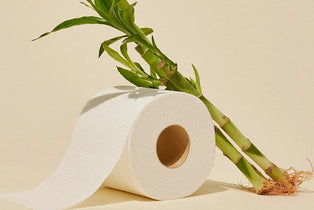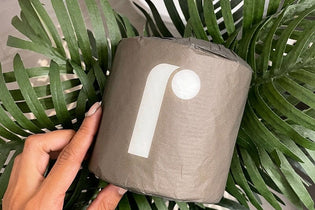
TLDR
What is sustainable living?
Sustainable living refers to the everyday choices we make that directly affect both the global environment and the local communities that we live in. This encompasses everything we do and each choice we make - such as the products we decide to use in our home, whether or not we use sustainable public transportation, and the foods/beverages we consume throughout the day. As consumers and citizens, you are actively choosing options that reduce your carbon footprint and minimize your use of valuable natural resources.
The reality is, a sustainable lifestyle is something that we need to be reassessing and optimizing consistently in our life. We are never going to be perfect and there are constantly new factors or information that we need to consider - but it is something that people need to be actively involved in.
Ways to Be More Sustainable
We wanted to walk you through six easy sustainable living tips to practice in your everyday life.
#1 Low-impact transportation
The inefficient use of natural uses such as fossil fuel is pretty well documented for the negative environmental impact on our planet. By choosing sustainable, low-impact transportation alternatives you are having an immediate impact on the environment.
There are many factors that come into play when discussing low-impact transportation. For example, does the city or town you live in provide safe, affordable public transportation? Many cities or towns were built with this in mind and provide great sustainable alternatives for their citizens. In other places, not so much. This is a great example of factoring this sustainability into your plans - if these alternatives are not available, how does that factor into your evaluation of where to live?
In terms of low-impact transportation alternatives, there are a few different options and again it will largely depend on where you live. Walking and biking are the best options - not only will they save you money and help the environment, but they will also be better for your health and help connect you to your local community. Another sustainable option is public transportation - one metro train can transport the same amount of people as hundreds of taxis or Ubers. If your area does not offer clean/safe transportation - then a good alternative is to carpool with friends/colleagues when possible. You can also incorporate sustainability into the workplace by encouraging employees to take public transit to the office rather than driving. This takes a little extra planning but will minimize your environmental impact and potentially save you some time in the carpool lane ;)
#2 Always consider your water

This is a big one and rapidly coming more to the forefront as we see droughts across different parts of the world. We currently live in a world where we are seeing clean water levels reach points that they have not reached since centuries before us. This is a multi-fold problem, not only is climate change leading to rapidly changing weather and more extreme weather events, such as the droughts we are experiencing. There is also the growing population that is putting more stress on our existing water resources. Lastly, bad water management and using water for illogical, unsustainable reasons are still very common and have yet to be fully put in check by governments.
So what can you do to consume water in a sustainable way? First - limit your water use at home and in your everyday life. Try to skip the long showers with your playlist going and opt for a shorter shower and let the playlist go as you dry off and continue to get ready. Also, take a look at water-saving alternatives for your home - low-flow appliances such as toilets can make a significant difference in your consumption.
Second - bring your own refillable and reusable water bottle everywhere you go. Plastic bottled water not only lead to pollution but are terrible actors in the global community.
#3 Choose minimalism
In the world of fast fashion and easy one-click purchases - we have largely been trained to buy new products the second we think we need them. Unfortunately, this is the exact opposite of sustainable living and is a large force behind the negative impact we as a society have had on our planet.
Every time you make that easy choice to just grab something new you are directly contributing to a chain of events that feeds on itself and becomes a tough wheel/system to stop. Take a TV for example - if you need a new TV and go to an online retailer to buy a new one - that new TV is made from resources that were extracted from this planet or used energy to manufacture. This also triggers the use of new packaging to get the TV to you, the delivery of the item to your house, and the data point for the inventory for that company that it needs to refill.
“Are you telling me to not have a TV?”. Absolutely not. That is one recurring theme that we think is important when thinking about sustainable living - in most of these cases - we are not saying you need to make a drastic change, but that it is important to consider small, simple changes that can have a big impact. Such as the TV example - a sustainable practice would be to look at local listings for used TVs that have already entered the market. Many times these will be cheaper alternatives and have a significantly smaller impact on the planet. Another thing to consider is the quality and longevity of new purchases - did you do your research, will this TV last you a long time, does the company have a good reputation and customer service that can help you if a problem comes up?
#4 Sustainable energy use, all the time

We like to break this down into two categories. The first is making sure that you are practicing sustainable energy use in your home with your current energy sources. This might be the central air or the energy being used to power your electronics. For things like this - make sure that you are keeping an eye on these and powering them off when they aren’t being used or when it isn’t necessary.
The second category is choosing sustainable renewable energy alternatives, such as solar, wind, or other clean sources. This is a little more complex and will depend on what your state allows, but if you can afford to make the switch to sustainable, Green-e-certified companies it will have a huge impact on your sustainability journey.
5. Check your product labels and details
When purchasing products, be sure that you are reviewing their labels, packaging, and website when purchasing to better understand their business practices. This can be a lot to take in, especially because each category of products has different specifications and certifications, so you need to do some research on your end. A good rule though is to opt for organic alternatives and to educate yourself on some of the bigger organizations that span across different product categories - such as B Corp or Fair Trade.
So if we think about this from the sense of easy ways to practice sustainable living - one option would be to take 30 minutes and do some research online on top certifications to look for with sustainable brands. The second search would probably be for top certifications within some of the categories you purchase consistently on your trips to the store. For example - with paper - you might look for the FSC Certified seal to make sure that the paper is coming from forests that are certified by the Forest Stewardship Council. For berries - you might write down USDA Organic. Then on your next trip to the store, when you are in each particular aisle and making your purchase, you can take a second to review the products and see if they meet your criteria.
As you get more used to doing this, you probably won’t even need to check your list and will know exactly what you are looking for.
6. Eat more plants, preferably locally grown

It is pretty well documented at this point, but meat production and the modern-day practices behind it are some of the most devastating when it comes to the health of our planet. As with a lot of things covered in this article, there are layers to this including land being clearcut to manage meat livestock, the agriculture that goes towards feeding these animals, massive water use throughout the industry, and much more. Through false marketing - the demand and allure for meat have become a staple in the American diet and that needs to change.
This is another great example of small changes having a big impact. Everyone's bodies are different and we are not saying to go completely meat-free, but there are three meals in the day and if you can opt for plant-based alternatives one meal a day or a few times a week, that is huge when it comes to living a sustainable lifestyle.
In this day and age, there are so many plant-based alternatives out there, in many cases, you might not know the difference. For many recipes, however, the meat portion is a key ingredient and that is perfectly fine. However, when choosing the meat for that recipe, we advise you to check the labels and to buy locally when possible!
Buying locally should apply to all of your food purchasing if possible. By purchasing locally you are drastically reducing the impact of getting the products from point A (their fields) to point B (your home). Most times, this often gives you more opportunities to actually know what is happening in the place your produce is being grown and allows you to have a better understanding of the growing practices.
Why is Sustainability Important?
The importance of sustainability is ever-present in today's world. Living a sustainable lifestyle includes consciously working towards a world with fewer harmful carbon emissions, food waste, and pollution for future generations by making sustainable choices.
Not sure how to be more sustainable in your home life? Making the choice to follow sustainable development goals starts with small lifestyle changes such as using reusable items. Opting to utilize sustainable brands and products such as Reel Paper's bamboo paper products and bulk toilet paper instead of unsustainable options is a step towards responsible consumption. From recycled paper towels to bamboo toilet paper, find sustainable paper products for all your household needs at Reel.




0 comments